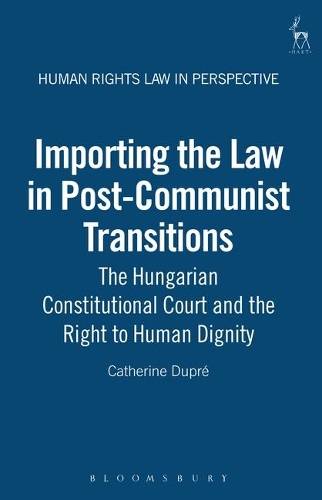
Importing the Law in Post-Communist Transitions: The Hungarian Constitutional Court and the Right to Human Dignity
(Hardback)
Publishing Details
Importing the Law in Post-Communist Transitions: The Hungarian Constitutional Court and the Right to Human Dignity
By (Author) Dr Catherine Dupr
Bloomsbury Publishing PLC
Hart Publishing
14th March 2003
United Kingdom
Classifications
Professional and Scholarly
Non Fiction
347.43901
Physical Properties
Hardback
240
Width 156mm, Height 234mm, Spine 19mm
Description
This book, one of the very first monographs on the Hungarian Constitutional Court available in English, is a unique study of the birth of a new legal system after the collapse of communism in Central and Eastern Europe. It shows that the genesis of the new legal order was determined by massive Western involvement and an unprecedented movement of export/import of law. Anchored in a detailed comparative study of German and Hungarian constitutional case law on human dignity, this book argues that law importation was a deliberate strategy carried out by the Hungarian Court in the early years of its operation. It explains how the circumstances of the transition and the background of the importers determined the choice of German case law as a model and how the Court used it to construct its own version of the right to human dignity. It highlights the Hungarian Court's instrumentalisation of imported law in order to lay the foundations of a new conception of fundamental rights. While focusing on the Hungarian experience, this book engages with international debates and provides an original theoretical framework for approaching the movement of law from the importers' perspective.
Reviews
...an excellent monograph.. Catherine Dupr makes a remarkable contribution in this field. -- Imre Lvai * Central European Political Science Review *
Dupre's discussion of the constitutional standing and interpretation of the idea of human dignity is lucid and informative. Its reading will benefit anyone, whether professional or academic, with an interest in comparative, constitutional human rights law. -- Spencer Zifcak * The Law and Politics Book Review *
Author Bio
Catherine Dupre is a Lecturer in Law at the University of Exeter.
